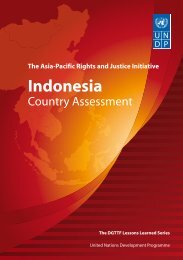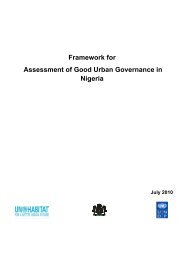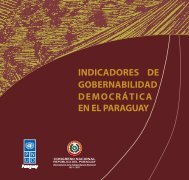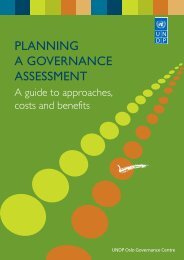A Users' Guide to Measuring Local Governance
A Users' Guide to Measuring Local Governance
A Users' Guide to Measuring Local Governance
You also want an ePaper? Increase the reach of your titles
YUMPU automatically turns print PDFs into web optimized ePapers that Google loves.
1.11 Key contextual fac<strong>to</strong>rs influencing the<br />
policy impact of assessment results<br />
The collection, assembly and publication of results<br />
for local governance performance serve little<br />
purpose if they do not have an impact on public<br />
policy-making at the local (and national) level. If it<br />
is exclusively donor-driven, there is the real danger<br />
that such an initiative will be reduced <strong>to</strong> a one-off<br />
exercise. But even when there is an element of<br />
local financial support, the issue of policy uptake<br />
and sustainability is still a serious challenge. This<br />
section examines the contextual fac<strong>to</strong>rs that need<br />
<strong>to</strong> be considered in order <strong>to</strong> ensure that policy<br />
uptake occurs and that this uptake is sustainable.<br />
The context of the assessment varies greatly across<br />
countries, according <strong>to</strong> three main fac<strong>to</strong>rs 20 : i) the<br />
main agent that carries out the assessment, ii) the<br />
relative openness of the political process <strong>to</strong> reform,<br />
and iii) the voice that the assessment achieves in<br />
the local public domain. Differences across these<br />
contextual features of each assessment will have<br />
an impact on the character of the assessment itself<br />
and the degree <strong>to</strong> which local governance reform<br />
is possible in the future.<br />
First, the nature of the main agent carrying out the<br />
assessment initiative is of major significance. The<br />
key distinction is between those assessments that<br />
are government-led and those that are civil<br />
society-led. Government endorsement adds<br />
official legitimacy <strong>to</strong> the exercise but in some<br />
contexts may negatively affect perceptions of its<br />
independence and validity. In addition, there are<br />
related issues, particularly in deeply divided<br />
societies, concerning the ideological or political<br />
affiliation of the agent, the composition and the<br />
representativeness of the team actually carrying<br />
out the assessment. Clearly, in order <strong>to</strong> maximise<br />
the political space for influencing policy uptake, an<br />
assessment team should be as broadly based<br />
as possible in order <strong>to</strong> bring all major local<br />
stakeholders and different sets of interests on<br />
board. A team that is <strong>to</strong>o narrow or one that is<br />
unbalanced or biased in some way can affect the<br />
legitimacy of the assessment and ultimately the<br />
possibility for reform.<br />
Secondly, the more the local governance system in<br />
general is open <strong>to</strong> reform the more likely will the<br />
particular assessment proposals themselves be<br />
better received and the reform process itself will<br />
be easier <strong>to</strong> initiate, implement and maintain. The<br />
impulse <strong>to</strong> carry out a local government<br />
assessment is often associated with some sort of<br />
crisis of governability, popular dissatisfaction or<br />
disquiet about the political status quo. In many<br />
countries, the ‘trigger’ for carrying out an<br />
assessment is precisely the recognition that a<br />
recent decentralization programme has not<br />
generated the expected improvements in local<br />
governance and service delivery.<br />
While the above two contextual fac<strong>to</strong>rs<br />
influencing the probability of an assessment<br />
leading <strong>to</strong> significant reform are relatively rigid, the<br />
third fac<strong>to</strong>r – the relative public presence that the<br />
assessment itself achieves – provides the agent<br />
carrying out the assessment with greater possibility<br />
of direct influence on policy uptake.<br />
There is a growing recognition that the failure of<br />
research <strong>to</strong> influence policy formulation is often<br />
the result of the absence of a clear communication<br />
strategy targeted at policy-makers.This is as true of<br />
local governance performance measurement as of<br />
any other area of research in the social sciences. For<br />
this reason, right from the start of the initiative,<br />
the agent carrying out the assessment needs <strong>to</strong><br />
develop a clear strategy for communicating the<br />
results, rather than leaving the design of such a<br />
strategy until after the results are available. This<br />
is because working with communications<br />
organisations, networks, and knowledge brokers<br />
early on increases the likelihood of take-up by<br />
target stakeholder groups later on. This strategy<br />
should be innovative, identifying and prioritising<br />
the ‘multiple points of entry’ by which the results<br />
can impact on opinion shapers and policy-makers<br />
– the plurality of local political organisations, social<br />
groups and civil society organizations, secondary<br />
schools and universities, as well as print media<br />
outlets, local television and community radio<br />
stations and via the Internet (webpage, blog,<br />
youtube, etc). This strategy should also include an<br />
agreed minimum spend in the overall budget on<br />
research communication.<br />
19<br />
See the UN Food and Agriculture (FAO) website for resources related <strong>to</strong> RRA - http://www.fao.org/docrep/W3241E/w3241e09.htm.<br />
20<br />
From “Assessing the Quality of Democracy – A Practical <strong>Guide</strong>”, Part 4: From Assessment <strong>to</strong> reform: influencing the democratic<br />
process, IDEA (2008)<br />
18 UNDP Oslo <strong>Governance</strong> Centre




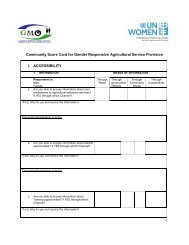

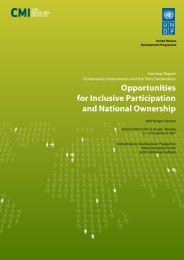
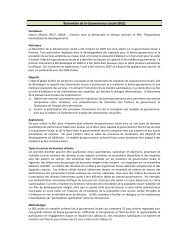
![GuÃa del Usuario ] - Governance Assessment Portal](https://img.yumpu.com/44740603/1/190x253/gua-a-del-usuario-governance-assessment-portal.jpg?quality=85)
